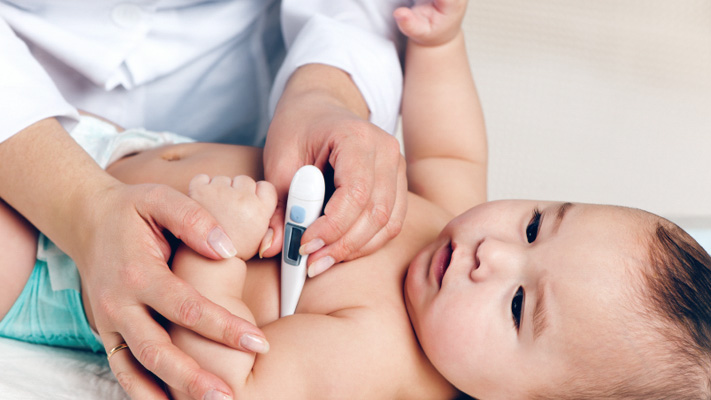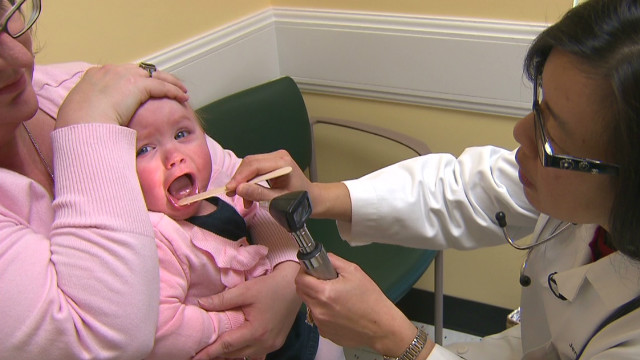For an infant's parents, teething can be a time of incredible excitement and joy. For the baby, this time can be accompanied by various symptoms such as excessive chewing and drooling.
However, these symptoms are almost always mild. As well, some children do develop a slight fever when this process starts. This fever, however, is also mild and short lived. Unfortunately, many have mistakenly assumed that any fever, even one which is severe, is simply part of the normal process with a new tooth.
Our Pediatric dentists in Colorado Springs have been informing patients that high fever is not normal. Recent studies have shown that severe fevers are not a normal part of teething. Parents should heed this insight. Please take the advice of pediatricians. If your child's fever reaches over 100 or lasts for a day or seems severe in any way, please call your doctor immediately. This is likely a symptom of an infection.
New teeth erupting through the gums is normal and brings some discomfort to some infants. But as this article explains, the normal symptoms are much less severe:

Don’t Fret, Parents. Teething is a Natural Thing
Researchers publish list of common symptoms when infants are teething. Fevers are not included.
Parents welcome the arrival of baby teeth as a sign their little pride and joy is developing along normal lines. But it’s not always a comfortable process for the baby … or the parents.
Now a meta-analysis of 10 studies from eight countries concludes there are common symptoms during the time that primary teeth emerge.
These include irritation of the gums and soft tissues as well as irritability and drooling. But while these symptoms are annoying, they do not usually become serious medical problems.
In fact, researchers said fevers are usually not symptoms of teething. This key finding is important to remember because parents whose infants develop high fevers should not assume it’s related to the surfacing of baby teeth. They should seek medical care for their children.
The findings were published today in the journal Pediatrics.
The new study defines tooth eruption as “a physiologic process in which teeth move from their development position within the alveolar bone to break the gum toward the oral cavity.” Don’t Fret, Parents. Teething is a Natural Thing
If your baby's symptoms are mild and more representative of the above stated normal behaviors, your job as a parent is to simply help them just get through it. Cooled chew rings are one excellent option.
However, if they are more severe, please take them seriously.
Recently CNN.com picked up the recent study's findings to share with their readers. So what should a parent watch for? If your baby is refusing to eat and is not staying hydrated and seems especially agitated and in more discomfort, please call your pediatrician immediately. More of the study is shared here:

No, your baby's fever was not caused by teething - CNN.com
(CNN) The commonly accepted conclusion that growing teeth causes fever among babies has been recently debunked by a medical study. The professional finding suggests that fevers may be caused by factors other than teething.
But despite the advice parents might have heard, a new analysis in the journal Pediatrics confirms that high-grade fevers are not a sign of teething. Rather, it might be a sign of another illness, and parents and doctors shouldn't just ignore it."If a child has a really high fever, or is in significant discomfort, or won't eat or drink anything for days, that's a red flag for concern," said Dr. Paul Casamassimo, director of the American Academy of Pediatric Dentistry's Pediatric Oral Health and Research and Policy Center.The analysis didn't completely dismiss a parent's intuition. It found the most common symptoms of teething were swollen gums, drooling and crankiness. Symptoms shouldn't last for more than three to five days, Casamassimo said, but he did acknowledge that it can feel much longer.
It's a laundry list of symptoms that every parent is familiar with -- a cranky baby who's drooling, not eating and not sleeping. No, your baby's fever was not caused by teething - CNN.com
Following along with the above article, the Parent Herald was quick to address these findings with its readers. They shared the Pediatric findings which were found to be causes for concern:
Doctors Reveal Teething Is Not The Cause Of Fever In Babies : Wellness : Parent Herald
The commonly accepted conclusion that growing teeth causes fever among babies has been recently debunked by a medical study. The professional finding suggests that fevers may be caused by factors other than teething.
It was also noted that the sprouting of teeth among babies are expected to cause drooling and swollen gums but fever is a different topic.
"If a child has a really high fever, or is in significant discomfort, or won't eat or drink anything for days, that's a red flag for concern," explained American Academy of Pediatric Dentistry's Pediatric Oral Health and Research and Policy Center director Dr. Paul Casamassimo in a CNN report.
Their study also found out the symptoms related to teething will last for three to five days only. Doctors Reveal Teething Is Not The Cause Of Fever In Babies : Wellness : Parent Herald
This is a time of joy for parents. It will also involve some discomfort for some children and inconvenience for parents. But this only happens once for the child.
Remember to relax, make them comfortable and share pictures of the new pearly whites with family. And remember as well to schedule the infant's first dental appointment with a pediatric dentist before the age of one. Preferably by the time the 7th or 8th tooth has begun to erupt through the gums.
021816_teethingfever_THUMB_LARGE.jpg image credit healthline.com
120412025008-hm-teething-00002028-story-top.jpg image credit cnn.com
Original Post Here: Teething Does Not Cause High Fever – Front Range Dental
No comments:
Post a Comment